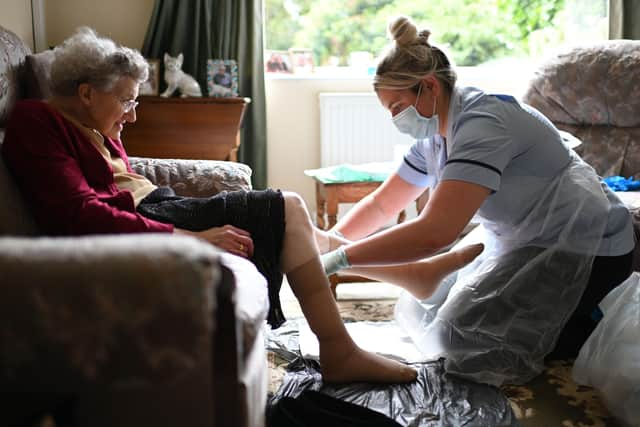Vaccines mean ‘very few’ Northern Ireland care home residents becoming severely ill despite record coronavirus outbreaks, but omicron staffing pressures cause ‘serious pressure’
and live on Freeview channel 276
This comes as a voluntary organisation warns that homes are coming under serious staffing pressures as increasing numbers of care workers contract the virus or enter self isolation.
While the number of outbreaks is now higher than ever — with 190 confirmed out of a total of around 480 homes in Northern Ireland — the Older People’s Commissioner Eddie Lynch has moved to reassure worried residents and relatives that vaccination efforts mean “very few residents are becoming seriously ill”.
Advertisement
Hide AdAdvertisement
Hide AdThat message has also been echoed by the Public Health Agency, who said they expect “a significant degree of protection to staff and residents”.


Care Home Advice and Support Northern Ireland (CHASNI) founder Julieann McNally has, however, warned that the wave of coronavirus infections sweeping across Northern Ireland is having an impact on care homes in other ways — with staffing pressures chief amongst the concerns.
She also stressed the importance of care home visiting, and urged worried relatives to make sure they are registered as a ‘care partner’ so that visits can continue even if the home has an outbreak.
“What we are seeing in terms of the admission of older people from care homes into hospital is that the majority are through falls,” the voluntary organisation founder told the News Letter.
Advertisement
Hide AdAdvertisement
Hide Ad“And that’s reflective of there not being enough staff. The staff are under a lot of pressure.”


Prior to the current wave of infections, fuelled by the more-transmissible omicron variant of coronavirus, the most care home outbreaks recorded at any given time came in November last year with 166.
And in the early stages of the pandemic, care homes were particularly hard hit by outbreaks with residents accounting for a high proportion of the overall death toll.
Ms McNally said: “When previous variants got into care homes, many people became very sick and people died.
Advertisement
Hide AdAdvertisement
Hide Ad“Now, with everyone fully vaccinated and boosted, we are not getting the same number of people going into hospital with serious illness.
“But what we do have is very clear evidence that closing down care homes can have a very serious and detrimental impact on residents’ mental health and wellbeing.”
She continued: “Omicron has taken out a lot of care home staff. Care homes are under a serious amount of pressure in terms of their staffing numbers.
“When visiting stops, some people are using their care partner to go in and make sure their loved one is eating well, making sure they’re well hydrated and helping with their personal care because they understand the pressure that care homes are under.”
Advertisement
Hide AdAdvertisement
Hide AdShe added: “If your home is on outbreak and you’re not registered as a care partner, get on to it quickly. Get on to your care home manager and your social worker and get it set up so that your loved one is not going to suffer by not seeing you.”
Older People’s Commissioner Eddie Lynch, meanwhile, said: “I understand people may be alarmed to see that outbreaks in care homes have increased so significantly within a short period of time, but this is not unexpected given just how highly infectious Omicron is, and the high rates of transmission in the community. For a care home to be declared in outbreak, it means two or more people have tested positive for covid and the routine testing of staff, visitors and residents is picking up infection.”
He continued: “It is also reassuring that reports are showing that very few residents are becoming seriously ill with the majority of cases either asymptomatic or displaying mild symptoms, which demonstrates how effective the vaccination programme and booster vaccination programme have been in reducing serious illness for older vulnerable people.”
Mr Lynch added: “However, we cannot be complacent and as a society we all need to be playing a role in trying to reduce the spread of COVID by continuing to follow public health advice. I would continue to appeal to those who can be vaccinated but haven’t done so yet, to get their jabs as soon as possible and that all those visiting care homes ensure to carry out lateral flow testing before every visit.”
Advertisement
Hide AdAdvertisement
Hide AdA spokesperson for the Public Health Agency (PHA) said: “The majority of recent outbreaks have been declared due to infections in staff members or visitors.
“The vaccination booster programme was prioritised in care homes in Northern Ireland, and we expect this will give a significant degree of protection to staff and residents, with therefore less severe disease in most instances than in earlier waves of the pandemic.
“A range of mitigations are in place to help stop the virus spreading in care homes including following COVID-19 infection prevention control guidance, regular testing for staff, residents and visitors, and increasing the uptake of the covid-19 vaccinations and booster vaccinations for care home residents and staff.”
The spokesperson continued: “The PHA has been working closely with the Department of Health, Health and Social Care Trusts, RQIA, Health and Social Care Board as well as care home managers to implement the rollout of the COVID-19 booster to residents and staff in care homes. This action is vital to minimise the impact that Omicron may have on care homes. Evidence shows that people who are fully vaccinated but who go on to contract COVID-19 can have less severe illness and are less likely to be hospitalised or die. We must continue to do all we can to keep our residents and staff as safe as possible from COVID-19.
Advertisement
Hide AdAdvertisement
Hide Ad“We know that the vaccine booster can significantly increase protection against Omicron, and local health services are undertaking a huge upscaling of the booster programme to support this. If you are eligible to receive the booster, please get it. If you haven’t yet had your first or second jab, please don’t delay in getting them as advised, as you are aware levels of community transmission are very high at present and the benefits of vaccination are clear – it helps protect you and those close to you.”